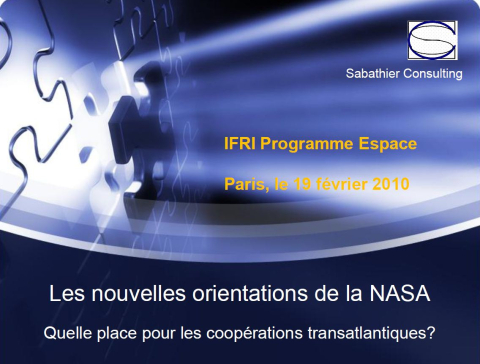
Practical information
Breakfast meeting.
Presented by President Obama on Monday Feb 1st, the new roadmap for NASA puts an end to the Constellation program, appeals to the private sector to service the ISS and aims to re-focus the Agency on innovative technology development. Is this new direction a promising one? What possibilities does it open for future cooperation with ESA and European countries, and what could the latter propose?
With Vincent Sabathier, former CNES Representative at the French Embassy in Washington DC, then a Senior Fellow on Space Issues at CSIS, now Chairman of Sabathier Consulting and Senior Associate for the Technology and Public Policy Program at CSIS; Chaired by Dr. Laurence Nardon, Head of the Space Policy Program at Ifri.
Other events

From Ambition to Action: Exploring Technological Partnerships with India
The 16th EU-India Summit, held on January 27th in New Delhi with European leaders António Costa, Ursula von der Leyen, and Prime Minister Narendra Modi, marks a significant milestone in deepening EU-India relations. At the same time, official bilateral visits from EU member states are on the rise, including that of the French President, who visited India in February to participate in the Artificial Intelligence Summit. As India asserts its technological ambitions and seeks to reduce its dependence on China, Europe is stepping up its efforts to diversify its strategic partnerships.

The Enlargement of the European Union: A Strategic Choice? France, the Western Balkans and the EU in an Uncertain Geopolitical Context
Russia’s war against Ukraine has brought the enlargement of the European Union back to the centre of European strategic debates. In this context, the Western Balkans have regained heightened visibility in discussions on the continent’s security, at a time when the international environment is marked by a growing number of destabilising factors.






